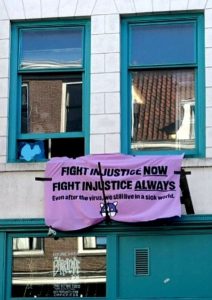 Yesterday we had an online assembly to discuss together the current situation of the Corona-crisis in the Netherlands, how this is affecting us and other people around and what we can still do.
Yesterday we had an online assembly to discuss together the current situation of the Corona-crisis in the Netherlands, how this is affecting us and other people around and what we can still do.
It was a nice opportunity to listen to each other and we also had a good response from other people that joined us. In a society that wants us isolated not just now, but even when there’s no necessity of physical distance, it is so important to create spaces to connect and collectivize thoughts, and now more than ever.
In the following we put down some notes from what was discussed in the hope that, even if super-incomplete, they might be of help to other people.
We started by sharing our personal feelings about the situation. Feelings of worry and confusion were mentioned by many people. It was also noticed by many how this crisis was making more visible the social injustices that are already present in the society. The fear was there that these conditions might only get worse, and people were torn between hoping that these moments might lead to some systemic change and just despair or fear that things will just go back to how they were before this whole thing started.
Also, as people are seeing their economic situation under threat, some felt the tension between on one hand needing to ask for help from the state and on the other hand just wanting the system to collapse.
Then we started talking about the current situation and three topics were discussed more in depth.
We started talking about how the Dutch government and the mainstream media have been framing the corona-crisis. We have been seeing a lot of criminalisation of individual behaviour and for example using people’s ‘anti-social behaviour’ as scapegoat for a change in policy and measures that were taken way too late. This all without considering the situation of people still needing to leave their house to go to do completely non-essential jobs just to keep the economy running. Activities the suspension of which has never even been mentioned so far.
This is similar, despite the obvious economic and political differences, to the situation in Italy, where people are still forced to work in sectors like the weapon industry putting their health at risk everyday, while at the same time there is an increasing militarisation of the streets and criminalisation of people who leave the house even just for a run alone.
We discussed ways to counter this narrative and also to raise awareness on workers’ conditions (also those same workers who are now hypocritically called ‘heroes’ whose working conditions and salaries have been victims, like those of many other workers, of unstopped budget cuts and other neoliberal reforms).
Then, starting from our situation as Barricade collective, we reflected a bit on what does it mean to offer help at this moment in the ‘Participatiemaatschappij’. Since two weeks we have been part of the Solidarity Kitchen, an effort that was set up to respond to some of the consequences of the measures: namely that many places where a lot of homeless and undocumented people usually got a meal had to close their doors, leaving them without any. Beside the usual tension that we feel between a certain charity work versus mutualism, we also reflected on the fact that the gemeente was not taking any responsibility and indirectly putting volunteers to work without having to care about their own safety nor about the safety of people without a home.
Once again here, the pandemic is only exposing something that was already there, that is the policies of ”Participatiemaatschappij’ (also known in the UK as “The Big Society”), a set of neoliberal policies put in place to hand out the disappearing welfare system more and more to institutionalized volunteers organisations. A twisted kind of people’s self-management, since there is no real autonomy from the state, the state just drops its responsibility on certain aspects of welfare while still keeping the control in the end.
We reflected on the necessity of exposing this contradiction.
The last point we discussed was the necessity of making radical leftist ideas accessible and understandable to everybody, yet again a renown problem but one that becomes more necessary now. It was underlined with many examples the general disconnection that there is between activists and a big part of society, especially the one that might need support in this moment. An example was made with the huge number of support projects sprouting online with many people ready to help and very few people asking for help. Online communication does not make it accessible to everybody and moreover it is typical of online platforms to reinforce self-enclosed bubbles, the probability of reaching people outside of our circle in this way is quite low.
We also discussed the necessity of finding ways to reclaim the public space, in these times of isolation, by spreading relevant information in different ways.
With these ideas in mind we concluded the meeting, we’ll try to put some stuff in practice (as always) and see to continue creating spaces online as a way to collectivize reflections and community care.
